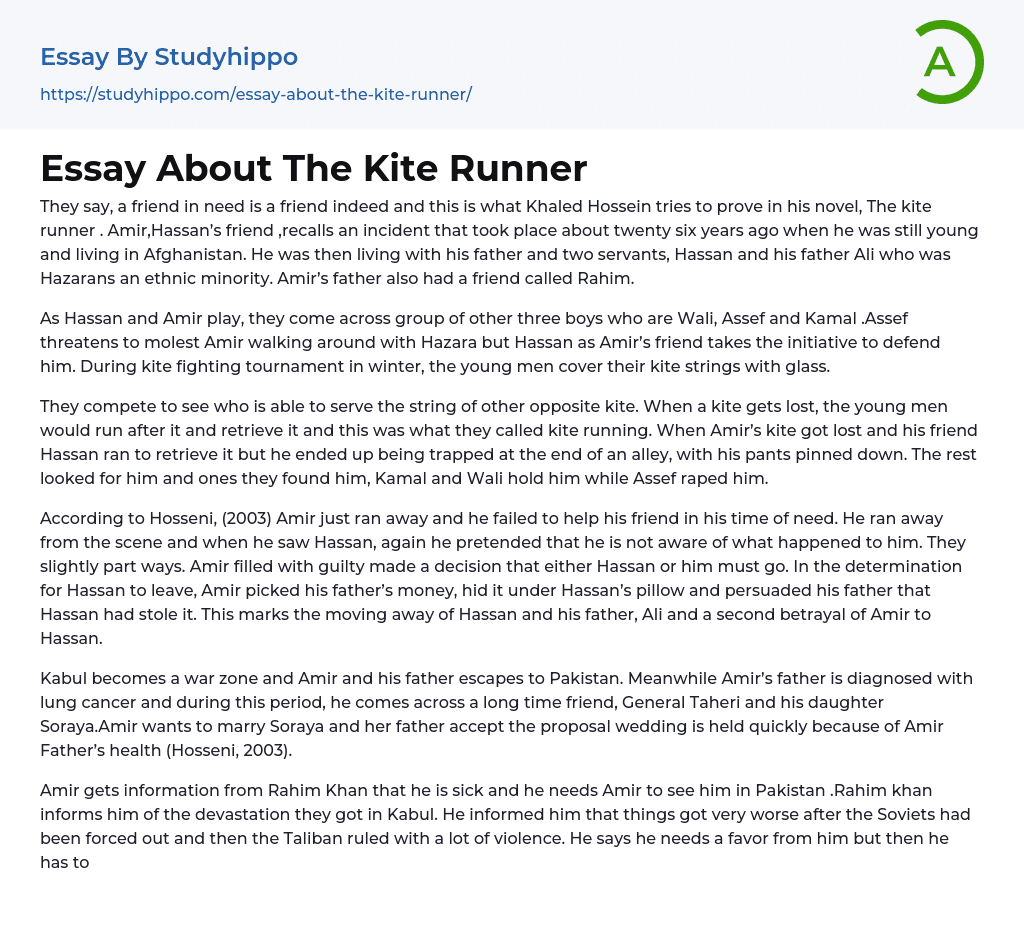In his novel, "The Kite Runner," Khaled Hossein seeks to prove the saying "a friend in need is a friend indeed." Amir, who is Hassan's friend, recounts an incident that occurred twenty six years ago when they were living in Afghanistan. At that time, Amir lived with his father, two servants named Hassan and Ali, who belonged to the ethnic minority group called Hazarans. Amir's father also had a friend named Rahim.
As Hassan and Amir engage in play, they encounter a group of three other boys named Wali, Assef, and Kamal. Assef makes a threatening comment about potentially harming Amir, who is walking with Hazara, but Hassan, being Amir's friend, takes the lead in defending him.
During a kite fighting competition in the winter, the young men protect their kite strings by coating them with glass. They compete to see
who can successfully sever the string of an opposition's kite. If a kite gets lost, the young men would give chase and retrieve it, a practice known as kite running. When Amir's kite goes missing, his friend Hassan goes after it but finds himself trapped in a dead-end alley with his pants pulled down.
During the dire situation, where Assef was assaulting him, Kamal, Wali, and others searched for Hassan. Amir escaped the scene and abandoned his friend when he needed him the most, as noted by Hosseni (2003). Afterward, Amir encountered Hassan but feigned ignorance towards the horrific event. Their paths began to diverge slightly.
Feeling guilt-ridden, Amir ultimately decides that either he or Hassan must leave. In order to make Hassan go, Amir plants his father's money under Hassan's pillow and convinces his father tha
Hassan has stolen it. This results in the departure of both Hassan and his father, Ali, and serves as a second betrayal of Amir towards Hassan. As Kabul becomes engulfed in war, Amir and his father flee to Pakistan. Meanwhile, his father is diagnosed with lung cancer and during this time, he reconnects with an old friend named General Taheri and his daughter Soraya. Amir wishes to marry Soraya and her father agrees to the proposal. The wedding is hastily arranged due to Amir's father's failing health (Hosseni, 2003).
Amir receives a message from Rahim Khan, who informs him that he is ill and requests Amir's presence in Pakistan. Rahim Khan shares news of the devastation in Kabul, particularly after the Soviets were forced out and the Taliban took over, bringing with them widespread violence. He asks for a favor, but first reveals the tragic fate of their mutual friend Hassan. Hassan and his wife were convinced to return to Kabul, only to be murdered, leaving their young son Sohrab to be sent to an orphanage. In this dire situation, Amir's friend once again betrays Hassan.
According to Winkler (2007), Rahim Khan informs Amir about his true relationship with Hassan and asks him to bring Hassan's son Sohrab from the orphanage. Rahim Khan explains that there is a couple in Pakistan who will take care of Sohrab. In the orphanage, Sohrab is made to wear feminine clothing, suggesting that he is subjected to sexual abuse by the men there. Amir recognizes one of the guards, Assef, who had previously threatened him. Assef threatens to kill Amir, but before he can do so, Sohrab shoots him in the
eyes, leaving Amir critically injured. This incident reveals that there was no actual couple willing to care for Hassan's son.
Amir's lack of true friendship towards Hassan is evident through his repeated betrayals, pretending to be his friend and abandoning him when he needed help the most. Amir takes no action to demonstrate his genuine friendship towards Hassan.
On the other hand, Hassan demonstrates his unwavering loyalty as a true friend to Amir. He has provided assistance countless times without ever abandoning him in his times of great need.
References
- Hosseni, K. (2003). The Kite Runner.
- Winkler, l. k. (2007). The Kite Runner.
- 1984 essays
- A Farewell to Arms essays
- A Good Man Is Hard to Find essays
- A Hanging essays
- A Lesson Before Dying essays
- A Long Way Gone essays
- A Rose For Emily essays
- A Separate Peace essays
- A Tale Of Two Cities essays
- A Very Old Man With Enormous Wings essays
- Adventures Of Huckleberry Finn essays
- Alice in Wonderland essays
- All Quiet on The Western Front essays
- Allegory of the Cave essays
- An occurrence at owl creek bridge essays
- Animal Farm essays
- Anthem essays
- Antigone essays
- Arthur Conan Doyle essays
- As I Lay Dying essays
- Atticus Finch essays
- Barn Burning essays
- Battle Royal essays
- Beauty and The Beast essays
- Beloved essays
- Boo Radley essays
- Brave New World essays
- Candide essays
- Castle essays
- Characters In Hamlet essays
- Characters In Romeo And Juliet essays
- Christmas carol essays
- Chronicle of a Death Foretold essays
- Cinderella essays
- Crime and Punishment essays
- Daisy Miller essays
- Death of a Salesman American Dream essays
- Desdemona essays
- Diary Of A Wimpy Kid essays
- Dracula essays
- Dubliners essays
- Emma essays
- Ender'S Game essays
- Ethan Frome essays
- Eveline essays
- Fahrenheit 451 essays
- First-Person Narrative essays
- Fish Cheeks essays
- Frankenstein essays
- Genesis essays




